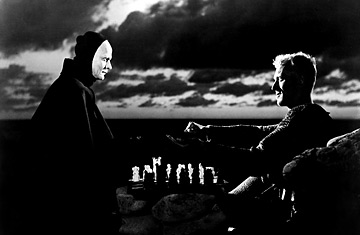
Regarded as one of the most significant films ever made, Bergman's first masterpiece features Max von Sydow and Bengt Ekerot as Death.
(2 of 3)
We scholarly types fell in love with these preoccupations: with his view of men as weak connivers and women as the wise life force; with the trickery of art (in his dark, delightful comedy The Magician); with his studies of sexual alienation (The Silence), his inside investigations of minds tumbling into madness (Through a Glass Darkly) or muteness (Persona); with his trips into the poignant past (Wild Strawberries); especially with his long battle with God, to which he devoted an entire trilogy. Bergman made anguish sexy, emotional neediness a turn-on. We had no reservation in naming him the world's greatest filmmaker.
In the '70s, Bergman's reputation had reached a level so majestic that Woody Allen, fresh from his Oscar-winning Annie Hall, renounced comedy to make Interiors, his first of several dramas in the Bergman style and somber mood. Also in the '70s, indie director Wes Craven remade The Virgin Spring as a low-budget, highly regarded horror film, The Last House on the Left. Stephen Sondheim brought the stately domestic deceptions of Smiles of a Summer Night to Broadway with A Little Night Music (and its worldly-wise ballad, Send in the Clowns).
A body of work that imposing, that serious, was bound to inspire parody — and did, long before Colbert. Allen, for example, had written a burlesque on The Seventh Seal in The New Yorker. Sometimes whole movies were tongue-in-cheek tributes to Bergman: George Coe and Tony Lover's 1968 American short De Duva (where "water" is the subtitle for the mock-Swedish "aitch-two-oh-ska") and the 1975 Monty Python and the Holy Grail. The spin-offs might be serious, they might be farcical, but all paid tribute to Bergman's unignorable influence.
BECOMING BERGMAN
He was born in Uppsala, on July 14, 1918, to a Lutheran minister and his wife — two figures, one forbidding, the other warming, who inspired many characters in Bergman films, and who appeared with little fictional orientation in his late works Fanny and Alexander, The Best Intentions and Private Confessions. Young Ingmar, we'll guess, was a broody, moody soul with one artistic passion: the magic lantern he was given as a child, and whose miraculously moving images he would later remake and replace with his own. His autobiography is called The Magic Lantern and is mostly a litany of his loneliness and gaucheries. You would think such an inward lad was trapped in a shell he could never come out of.
Yet he was a sensation right from his college days. Sten Selander, reviewing Bergman's Death of Punch at Stockholm University's Student Theater, wrote in Svenska Dagbladet: "No debut in Swedish has given such unambiguous promise for the future." A budding Scandinavian dramatist, with Ibsen and Strindberg as his models, might devote himself fully to the theater. That indeed would be Bergman's full-time job, heading stage companies in Malmo and then Stockholm, directing productions that toured through Europe and later the U.S. and won him the reputation as a great and daring interpreter of the classics. (His productions of Long Day's Journey into Night, with Bibi Andersson, and Miss Julie, with Lena Olin, were triumphs at the Brooklyn Academy of Music.) Stage work occupied this indefatigable artist nine months a year; then, on his summer vacations, he would make these movie masterpieces.
The dominant, domineering authorial voice in Bergman's films was an expression of his own force of personality. He mesmerized actors, his crew, producers, everybody. In the early '40s he applied for a writing job at Svensk Filmindustri, the main movie studio in Sweden, and was interviewed by Stina Bergman, widow of playwright Hjalmar Bergman and head of the studio's script department. "He seemed to emerge with a scornful laugh from the darkest corner of Hell," she later recalled, but with "a charm so deadly that after a couple of hours' conversation, I had to have three cups of coffee to get back to normal." She hired Ingmar that day.
Besides, in the decade before his international success, the cinema offered a busy young man with a seductive intensity something he couldn't readily get from theater: money. "I was very poor at the time, you know," he said. "I already had a lot of children and a lot of women, and money had to be paid out. A good deal of my filmmaking in earlier days came from lack of money." The movies' greatest "woman's director" was also a great lover and careless discarder of women. Rumor had it that the seven lead actresses in his 1964 comedy All These Women were all former Bergman mistresses.
